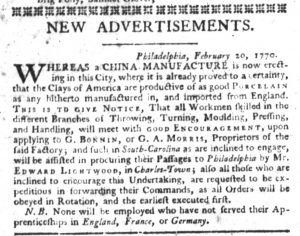What was advertised in a colonial American newspaper 250 years ago today?

“A CHINA MANUFACTURE.”
In January 1770 an advertisement for “New China Ware” ran in the Pennsylvania Chronicle. In it, the “CHINA PROPRIETORS in PHILADELPHIA” advised both retailers and consumers that they had set up production of porcelain “as good … as any heretofore manufactured at the famous factory in Bow, near London, and imported into the colonies.” This enterprise aimed to provide colonists with alternatives to imported merchandise; both imported goods and “domestic manufactures” assumed new political significance when merchants and shopkeepers adopted nonimportation agreements to protest the duties levied on imported paper, glass, paint, lead, and tea in the Townshend Acts.
Two months later an advertisement about the “CHINA MANUFACTURE … now erecting” in Philadelphia appeared in the South-Carolina Gazette and Country Journal. The proprietors, G. Bonnin and G.A. Morris, had two purposes in placing that notice: recruiting workers and marketing their wares. They reiterated the claims they made in the Pennsylvania Chronicle, proclaiming that “the Clays of America are productive of as good PORCELAIN as any hitherto manufactured in, and imported from England.” Given those resources available to them, the proprietors also needed “Workmen skilled in the different branches of Throwing, Turning, Moulding, Pressing, and Handling.” In a nota bene at the conclusion of the advertisement they proclaimed that “None will be employed who have not served their Apprenticeships in England, France, or Germany.” Bonnin and Morris eschewed imported goods, but they still wished to draw on skills that had been learned on the other side of the Atlantic. The quality of the “Clays of America” alone did not yield finished goods that competed with those produced in England. To assist in acquiring the skilled workers they needed, the proprietors designated a local agent in Charleston. They instructed “such in South-Carolina as are inclined to engage” that they would be “assisted in procuring their Passages to Philadelphia by Mr. EDWARD LIGHTFOOT.”
In addition to seeking workers, Bonnin and Morris made an appeal to prospective customers, “those who are inclined to encourage this Undertaking.” They did not explicitly state that consumers had a duty to purchase goods produced in the colonies, but given the news and commentary that appeared elsewhere in the newspaper the proprietors likely depended on readers making such connections between consumption and politics. Bonnin and Morris both invoked a sense of urgency and suggested existing demand for their wares, requesting customers “to be expeditious in forwarding their Commands” while also clarifying that “all Orders will be obeyed in Rotation” with “the earliest executed first.” In so doing, they again repeated marketing strategies incorporated into their earlier advertisement in the Pennsylvania Chronicle.
Bonnin and Morris’s efforts to produce “domestic manufactures” and promote them to consumers were not merely local or even regional endeavors. They looked far beyond Philadelphia and the Middle Colonies when recruiting workers and customers, further strengthening networks of both print and consumption that increasingly contributed to a sense of an imagined community that stretched from New England to Georgia.
